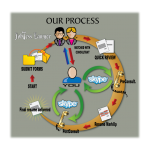Before You Apply (Key Steps to Take Before Submitting to Your Dream Job)
Melissa Pollack spent 6 years working in the recruiting departments at some of the nation’s top law firms including Simpson Thacher, White & Case and Sonnenschein. She has been helping attorneys prepare their resumes and prepare for interviews for over 10 years.
So now that your resume is ready, and you’re going to start applying for jobs, take a moment and do a few things first:
- Google yourself. Any employer worth his/her salt will do at least a brief search on an applicant before extending an offer. Go through the first 2-3 pages of results and make sure you’re ok with everything that comes up. Articles you wrote for your high school newspaper? No problem! Incriminating spring break photos? Not so much.
- You should have 3 professional references lined up for yourself before you begin your interview process. Talk to your references and make sure they are comfortable being a reference for you. (You should NEVER list a reference without checking with him/her first!) You don’t need to send their contact information with your resume, but if an interview goes well, some employers will speed up the process and ask for your references at the end of your interview. Having a nicely prepared sheet with that information is helpful for your interviewer, and you won’t be scrambling to find phone numbers in your cell phone. In general, be careful using a current co-worker or boss as a reference – there are reasons to use them (say, if you’re being asked to go work for a client, or are moving because your spouse was admitted to graduate school in another state), but just be thoughtful about it. In addition, some law firms have policies about what kind of information they are willing to share during reference checks. Speak to Human Resources at your prior employers to find out their policies.
- If you’re applying for a legal position, get a few copies of your transcript from your law school. Some places will ask for it before considering your resume, some places will ask for it during the interview process, and some places may ask for it at the very end. But you’ll likely need it at some point during the process, so you might as well have it handy. Also, make a PDF copy of it in case they want it electronically.
- Sign up for email alerts on job websites. You can outline your search preferences and have sites email you new job listings on a daily basis. You can often do this on some company websites as well, so if one company is particularly interesting to you, sign up there, as well.
- Consider some difficult questions: How far are you willing to commute? Are you willing to re-locate? What’s your salary range? What’s the lowest salary you’re willing to accept? Are you willing to take a reduction in responsibility or a bad title? How will your next job affect your future career? Are you willing to take a temporary or contract job? Reaching these tough decisions will make your life a lot easier when you’re looking at job postings.
- Get recommendations from friends for placement agencies. Most law firms are avoiding placement agencies these days, especially at the associate level, so odds are, you’re not going to get much from them. But registering with one or two agencies that you trust can’t hurt and they will sometimes have inside information on different employers. However, you’re going to have to do a lot of the leg work on your own – you cannot use placement agencies exclusively and expect results anymore. Yes, occasionally, they will get an exclusive listing, or you’ll find a headhunter that has an excellent relationship with a certain firm, but unlike 10-15 years ago, placement agencies no longer have exclusive rights to law firm placements.
- For those of you with scientific backgrounds, PhDs in the sciences, or other high-tech skills, consider yourselves extremely lucky – you are in a very small minority, and seem to be in constant demand. The placement agencies may be more helpful to you than say, a 4th year corporate associate, as law firms often count on the agencies to find you.
- If you’re wary of working for another law firm or having trouble finding a job as an attorney, consider some other professional areas that sometimes look for people with JDs: Compliance/Risk Departments, Human Resources and Employee Relations, law schools (especially in Career Services and legal writing) and legal studies departments of colleges and universities, and legal support corporations (Lexis, bankruptcy-based companies, non-profits, etc.), just to name a few.
Let Melissa help you with your legal resume. Request her at the JL Approved Resume Service !
Copyright Melissa Pollack 2009
-
chase




